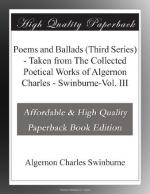|
This section contains 5,985 words (approx. 20 pages at 300 words per page) |

|
SOURCE: "'A Muse Funeral': The Critique of Elegy in Swinburne's 'Ave atque Vale'," in Victorian Poetry, Vol. 24, No. 2, Summer, 1986, pp. 173-88.
In the following essay, Zeiger explores Swinburne's innovative treatment of the elegaic form.
Elegy has traditionally been a search: until the last century, a search with a foregone conclusion. The elegist directed the elegy toward an ending in consolation, and the poem took its shape from that direction. But what does elegy seek when there can be no consolation? Where does it move, if not toward the self-ordained closure of a "Lycidas" or an "Adonais"? Different possibilities have emerged, and A. C. Swinburne offered one that would set the tone for modern elegies:
The pursuit becomes primary, the not finding. "Ave atque Vale" evokes openness, mystery, enigma; it luxuriates in the baffling relation between its hypnotic surfaces and the unanswered question it poses. For modern poets, "Lycidas...
|
This section contains 5,985 words (approx. 20 pages at 300 words per page) |

|


